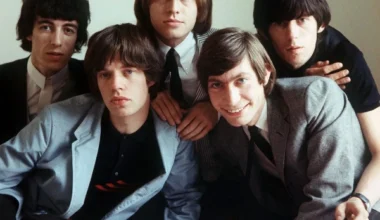AC/DC has always taken a different approach from many bands, choosing consistency over reinvention. While others might experiment with new sounds or image over the years, AC/DC has stayed true to the same powerful, high-energy rock sound since the 1970s, along with their iconic school-uniform stage look.
Known for delivering thrilling live performances, AC/DC might have mellowed slightly with age, but the experience and skill they bring to the stage are unrivaled. At venues like Wembley Stadium, the band remains a powerhouse.
The stage, not the studio, has always been AC/DC’s natural home, and few bands can rival them live. While Brian Johnson holds center stage, it’s guitarist Angus Young who makes the band tick. Young has a deep pride in the art of live rock ‘n’ roll and a reputation for his sharp opinions about bands that, in his view, don’t meet the standards he expects. Throughout AC/DC’s rise, he wasn’t shy about calling out some of rock’s biggest acts.
One memorable instance came in 1977 when AC/DC was still on their way up and hadn’t yet reached the monumental success they would see with Back in Black three years later. Despite AC/DC’s relative youth, Young criticized three iconic bands he believed had lost their way. At the time, Led Zeppelin had already dominated rock music for over a decade, yet Young was unimpressed with their live show.
Speaking to Classic Rock, Young shared his disappointment: “I’ve seen that band live. They were on for three hours. For two-and-a-half hours, they bored the audience.
Then at the end, they pull out old rock ‘n’ roll numbers to get the crowd movin’. That’s sick. They’re supposed to be the most excitin’ rock ‘n’ roll band in the world.”
Young didn’t stop with Zeppelin. He also thought The Rolling Stones had veered from their rock roots.
“Them and the Stones. They’re not playin’ it,” he said. “The Rolling Stones get up and play soul music these days. This is supposed to be rock ‘n’ roll.
Leave that to the people who do it best, the Black people. If the Stones played what they do best, they’d be a helluva lot better. They’d probably find themselves at ease.”
Young’s message to the Stones was clear: he felt they had lost their edge by straying from their rock foundations.
Years later, in 1984, Young aimed his criticism at Deep Purple. AC/DC had once opened for the British band, and Young had even paid to see them live, but he was left unimpressed.
Speaking to Guitar World, he said, “I saw Deep Purple live once, and I paid money for it, and I thought, ‘Geez, this is ridiculous.’”
Deep Purple reminded Young of a “poor man’s Led Zeppelin”—a band that didn’t resonate with him and, in his view, didn’t live up to the level of intensity and authenticity he valued in rock.
For Angus Young, rock ‘n’ roll is all about energy, authenticity, and staying true to the genre’s roots, and he wasn’t afraid to critique even the most revered acts if he felt they’d lost that spark. His comments reveal a musician with high standards for live performance and a commitment to the raw energy that has always defined AC/DC’s own sound.







